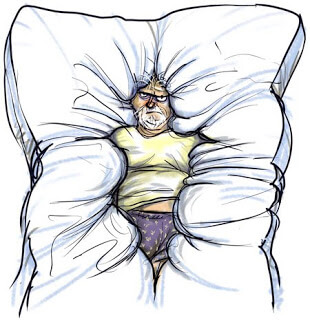Every purchase made online is encrypted with a high level of security you’ve come to expect. Your private information is never shared nor sold, so you can buy with confidence. You can also visit our store if you are in the St. Louis area.

FACT: Sleep helps to restore, refresh and heal the body. It rebuilds and recharges the body so you can make it through another day.
Sleep Tips:
- Put your body on a consistent sleep schedule and stick to that schedule
It is very important that we go to bed at the same time each night and wake up each morning at the same time, like the old cliché says we are creatures of habit. Be sure to stick to this routine or insomnia could result. - Do not sleep in on Saturdays and Sundays
When a person chooses to sleep longer on Saturday mornings he or she may find it hard to get back on right path when Monday morning rolls back around. - Do not take naps within 8 hours of your typical bedtime
Naps are know to reset your sleep clock and may disrupt your sleep schedule in the same way sleeping longer on weekends can. - Exercise
Be sure to consult your doctor first, but normal exercise 20-30 minutes a day can reduce stress and tension that contributes to sleep interruption. Do not exercise within two hours of your regular bedtime. Doing so has been known to interfere with good sleep. Ideal benefits from exercise seem to come from an exercise program that ends 5 to 6 hours before going to bed. - Avoid caffeine
Pass up drinks that include caffeine. Caffeine will keep you awake by acting as a stimulant. You will want to stay away from caffeine sources within 6 to 8 hours of going to bed.
Here Are Some Caffeine Stimulant Sources:- Coffee
- Chocolate
- Soft drinks
- Non-herbal teas
- Diet drugs
- Pain relievers can also be a source
- Avoid nicotine
It is not unusual at all for smokers to sleep very lightly. Many smokers will experience nicotine withdrawal causing them to wakeup early in the morning. Pass up the cigarettes within 6 to 8 hours of going to bed. - Avoid alcohol
Liquor deprives the body of the quality deep sleep needed to rejuvenate us, including REM sleep. Alcohol causes the lighter stages of sleep that contribute to our unrest so do not drink alcohol within 6 to 8 hours of going to bed. - Minimize drugs or eliminate them if possible
Prescriptions and over the counter medications can have an influence on your sleep process. Be sure to talk with your doctor to for a complete explanation of how your medication(s) may be affecting you. - Do not eat before bedtime especially large meals
Limit your meals or snacking to within two hours of bedtime. - If you cannot sleep do not continue to lie in bed trying to fall asleep
Doing so only tends to exasperate the problem. If you can’t get to sleep, get up and do something else. Read, watch TV, or even listen to some relaxing music until you start to feel tired. Simply laying in bed fretting over not being able to sleep only creates useless anxiety. This could lead to insomnia. When you start to feel sleepy, go back to your bed, do not just fall a sleep on the couch and areas other than your bed. - Practice a consistent relaxing bedtime ritual
We suggest reading a good book, drawing a warm bath, or another nightly calming routine that will help make falling sleep easy. Think of it as training for your body and mind. Continually practice this fundamental art of letting go. It will allow you to surrender to a good night of rest. These restful habits and activities before bedtime help support better sleep. Do not confuse rest with recreational or sporting activities you enjoy. Example: (Bowling) - Turn of the TV and the Radio
This is a terrible habit to start. People who find it easy to fall a sleep with these items turned on can unconsciously correlate the bedroom with something other than nightly sleep. These same individuals typically do not sleep soundly due to the noise and disruption. It is no uncommon for these people find it hard to fall asleep when such crutches are not available.
This is part one of a two part series. Click here to read part two.
